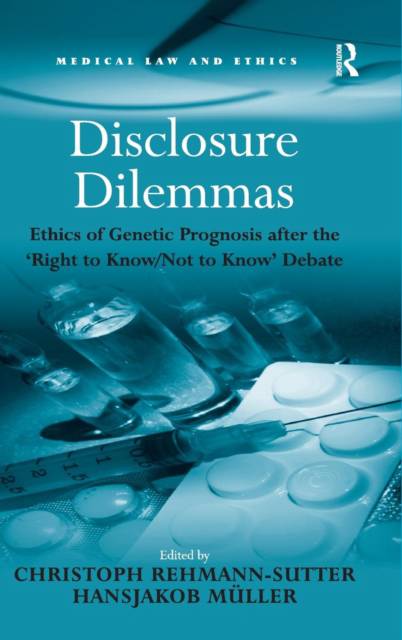
- Afhalen na 1 uur in een winkel met voorraad
- Gratis thuislevering in België vanaf € 30
- Ruim aanbod met 7 miljoen producten
- Afhalen na 1 uur in een winkel met voorraad
- Gratis thuislevering in België vanaf € 30
- Ruim aanbod met 7 miljoen producten
Zoeken
Disclosure Dilemmas
Ethics of Genetic Prognosis after the 'Right to Know/Not to Know' Debate
Hansjakob Müller
€ 305,45
+ 610 punten
Uitvoering
Omschrijving
There exists today a fast growing availability of personal genetic information. Its prognostic impact and value for an individual or family member's health is sometimes unclear, whilst at other times it is clear-cut. The issue of whether to disclose genetic information does however have wide ranging implications. Avoiding the rhetoric of 'genetic exceptionalism', and drawing on an expanded field of bioethical, sociological and anthropological research, this book sets a new agenda for discussing the ethics surrounding the disclosure of prognostic genetic information. A hermeneutical approach reconsiders the ethics of disclosure in a variety of contexts in which genetic information is generated, requested, interpreted or communicated - from the provider perspective, but also from the moral perspectives of clients and their families. It is in situations of disclosure, in these different contexts, that genetic information meets morality. Providers and recipients can become vulnerable to the revelation or concealment of information, and the forms in which it may be provided. Disclosure Dilemmas invites readers to explore these contexts from an ethical viewpoint and will be a valuable resource for anyone with an interest in biomedical ethics.
Specificaties
Betrokkenen
- Auteur(s):
- Uitgeverij:
Inhoud
- Aantal bladzijden:
- 296
- Taal:
- Engels
- Reeks:
Eigenschappen
- Productcode (EAN):
- 9780754674511
- Verschijningsdatum:
- 15/06/2009
- Uitvoering:
- Hardcover
- Formaat:
- Genaaid
- Afmetingen:
- 156 mm x 234 mm
- Gewicht:
- 594 g

Alleen bij Standaard Boekhandel
+ 610 punten op je klantenkaart van Standaard Boekhandel
Beoordelingen
We publiceren alleen reviews die voldoen aan de voorwaarden voor reviews. Bekijk onze voorwaarden voor reviews.







